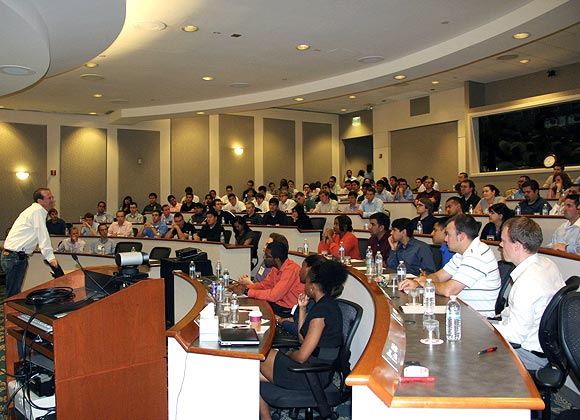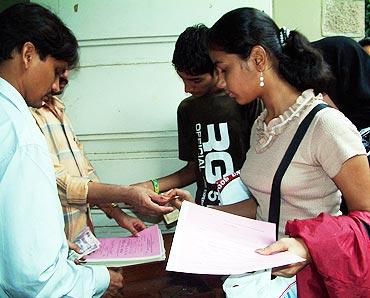 | « Back to article | Print this article |
Study abroad: Is your UK degree of value in India?
The one-year post graduate programme from the UK is not recognised in India. The three-year professional degrees are also not valid. These norms restrict students from pursuing further education in India, and prohibits them from taking faculty positions in Indian colleges.
Varun feels cheated. His one-year Master's degree from the UK hasn't held him in good stead in India.
Till a month back, Varun was an Assistant Professor in one of the well known colleges of Tamil Nadu. Today, he is under termination notice because the college declared his UK Master's degree null and void.
That he has a one-year Master's degree from London South Bank University, was known to the college at the time of recruitment and it was fine with the college. But after three months, due to reasons best known to the college, it decided his degree was not valid.
An embattled Varun is now taking his matter to court to get an extension on his termination notice from one to at least three months. The 32-year-old is also worried about his family whom he had re-located because of the job.
Varun's case is not isolated. Another student Vaibhav, a 2009 student of MSc (in International Business) from Nottingham University Business School, UK, is also on the same boat.
A dismal economic condition forced Vaibhav to return to his base, Rajasthan in 2010. Upon his return, when he applied for PhD at a government university, he was rejected.
Both of them don't regret their decision of UK studies. The exposure gained was remarkable, they say. What bothers them is their academic fate in India, which seems gloomy.
Please click NEXT to continue reading
An academic set back: UK master's degree
Indian government doesn't recognise UK Master's programme as it is of one-year duration.
So students who have completed one-year UK Master's can't pursue further education at any stage of their career, unless of course they backpedal to add two-year PG degree on their academic records. One year of UK Master's, for all academic purposes, is a worthless degree in India.
"Ironically, Indian government recognises distance-learning programme of two years in India, over a full-time, rigorous programme," says Varun. When he had enrolled in the UK programme, he was unaware of the regulation. Having cleared UGC-NET exam, he had all plans to return and pursue his love of teaching here.
The Association of Indian Universities (AIU), a government-aided body, responsible for granting academic equivalence of degrees/diplomas doesn't accord equivalence to UK Master's programme either. AIU declined to provide equivalence certificate to Vaibhav. Varun too applied and had to take several rounds of follow-up visits to the AIU office, only to get "no" as an answer.
However, UK aggressively promotes its Masters programme in India. UK universities conduct regular education fairs, either in tandem with British Council, the official education and cultural body of UK, or independently. But no official disclaimers about the invalidity are issued during these fairs.
The lenient attitude of Indian government hurts the academic careers and research interests of Indian students.
Most education agents too, don't reveal such details to unassuming students either out of ignorance or on purpose. So, while selling of Master's to students is done with full enthusiasm, no eagerness or interest is shown towards disclaimers and caveats.
Newcastle University, for instance, is launching six Master's research programme and 19 PG programmes. Its India office is engaged in advertising its launches, enrolling and sending students to parent campus too, but doesn't inform about this limitation.
When inquired by Careers360 on academic worthiness of UK Master's, it said, it prefers not to reply to this particular query.
University of Nottingham, alma mater of Vaibhav, too, has been running its Master's programme in collaboration with one of the leading Universities of South. There are several others. The programme field ranges from medical, allied medical to engineering and MBA.
"Engineering degree in UK is of three years and is not recognised in India," says Ravi Lochan Singh, an expert in student counselling.
One year MBA too is restrictive for students who wish to pursue MPhil or PhD at later stages of their profession.
Education reforms: A mirage?
Unfortunately, most students are unaware of this fact. A one-liner mention regarding de-recognition lies buried in the AIU website. But clearly it fails to fulfil its purpose.
Small wonder then, why it doesn't occur to potential students to question the agents and university counsellors on this aspect.
Collaborating Indian universities give self-disclosures a beating. The much touted education reform measures don't highlight any action taken on this front, if taken at all. A simple initiative like an attempt for equivalence is still to be sought.
"The providers and authorities have not even lobbied the case of the graduating students from UK to seek their qualification to be equal to Indian qualifications," says Ravi Lochan.
Careers360 approached AIU with the queries, but, in its defence, AIU delivered its refrain: "Decisions of these matters are taken by Ministry of Human Resources. We just implement."
Indian banks uninhibitedly disburse student loans for Master's. One could argue that banks are not incumbent to investigate this aspect and they are just disbursers, then by the same token, banks should also extend loans to domestic programmes falling under "de-recognised" list a la UK Master's.
A query placed to the Reserve Bank of India, which issues guidelines to banks on student loans, elicited no response.
Maybe the image of banks in the mind of students needs an over haul. Till now, applicants placed a certain degree of trust on the veracity of a college and its programmes when their loan applications are approved. It seems it's time to re-work on that trust, says a student.
Loan expert Harsh Roongta, CEO, Apnapaisa.com, says that students should do their due diligence. "Banks can't be held responsible."
Disappointed by Indian directives, Vaibhav sought answers from the British Council. However, the Council responded that it does not offer equivalence certificates and that "recognition of overseas degrees is guided by Government of India regulations".
The present regulations are drawing fire. Says Mr Lochan, "Before lobbying for work-rights for Indian students in the UK, India first needs to give our students the right to work in our country."
Today, Varun finds himself jobless, helpless and hopeless. Vaibhav doesn't feel any different, especially when he has to constantly look over his shoulder for working as a faculty member in one of the colleges, albeit, illegally. While they despair over their future, prospects of other academically inclined and research-oriented students continue to move towards a question mark.


